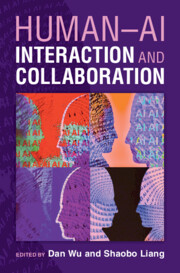Book contents
- Human–AI Interaction and Collaboration
- Reviews
- Human–AI Interaction and Collaboration
- Copyright page
- Contents
- Contributors
- Preface
- 1 Introduction
- 2 User Interaction for Human–AI Interaction and Collaboration
- 3 Privacy Identification of Human–Generative AI Interaction
- 4 Credibility Assessment of Human–Generative AI Interaction
- 5 AI-supported Crowdsourcing for Knowledge Sharing
- 6 AI-supported Search Interaction for Enhancing Users’ Understanding
- 7 AI for Human and Misinformation Interactions
- 8 Effective Human–AI Collaborative Intelligence
- 9 Human–AI Collaboration for Identifying Health Information Wants
- Chapter 10 Human–AI Collaboration for Scientific Discovery
- 11 Challenges of Generative AI on Human–AI Interaction and Collaboration
- 12 Conclusion
- References
1 - Introduction
Published online by Cambridge University Press: 19 September 2025
- Human–AI Interaction and Collaboration
- Reviews
- Human–AI Interaction and Collaboration
- Copyright page
- Contents
- Contributors
- Preface
- 1 Introduction
- 2 User Interaction for Human–AI Interaction and Collaboration
- 3 Privacy Identification of Human–Generative AI Interaction
- 4 Credibility Assessment of Human–Generative AI Interaction
- 5 AI-supported Crowdsourcing for Knowledge Sharing
- 6 AI-supported Search Interaction for Enhancing Users’ Understanding
- 7 AI for Human and Misinformation Interactions
- 8 Effective Human–AI Collaborative Intelligence
- 9 Human–AI Collaboration for Identifying Health Information Wants
- Chapter 10 Human–AI Collaboration for Scientific Discovery
- 11 Challenges of Generative AI on Human–AI Interaction and Collaboration
- 12 Conclusion
- References
Summary
In the technological wave of the twenty-first century, artificial intelligence (AI), as a transformative technology, is rapidly reshaping our society, economy, and daily life. Since the concept of AI was first proposed, this field has experienced many technological innovations and application expansions. Artificial intelligence has experienced three booms in the past half century and has developed rapidly. In the 1960s, marked by the Turing test, the application of knowledge reasoning systems and other technologies set off the first boom. Computer scientists at that time began to explore how to let computers simulate human intelligence. Early AI research focused on rule systems and logical reasoning. The rise of expert systems and artificial neural networks brought a second wave of enthusiasm (McDermott, 1982). The third boom is marked by deep learning and big data, especially the widespread application of artificial intelligence-generated content represented by ChatGPT. During this period, AI technology shifted from traditional rule systems to methods that relied on algorithms to learn patterns from data. The rise of deep learning enabled AI to achieve significant breakthroughs in areas such as image recognition and natural language processing.
Information
- Type
- Chapter
- Information
- Human-AI Interaction and Collaboration , pp. 1 - 13Publisher: Cambridge University PressPrint publication year: 2025
References
Accessibility standard: WCAG 2.2 AAA
Why this information is here
This section outlines the accessibility features of this content - including support for screen readers, full keyboard navigation and high-contrast display options. This may not be relevant for you.Accessibility Information
Content Navigation
Allows you to navigate directly to chapters, sections, or non‐text items through a linked table of contents, reducing the need for extensive scrolling.
Provides an interactive index, letting you go straight to where a term or subject appears in the text without manual searching.
Reading Order & Textual Equivalents
You will encounter all content (including footnotes, captions, etc.) in a clear, sequential flow, making it easier to follow with assistive tools like screen readers.
You get concise descriptions (for images, charts, or media clips), ensuring you do not miss crucial information when visual or audio elements are not accessible.
You get more than just short alt text: you have comprehensive text equivalents, transcripts, captions, or audio descriptions for substantial non‐text content, which is especially helpful for complex visuals or multimedia.
Visual Accessibility
You will still understand key ideas or prompts without relying solely on colour, which is especially helpful if you have colour vision deficiencies.
You benefit from high‐contrast text, which improves legibility if you have low vision or if you are reading in less‐than‐ideal lighting conditions.
